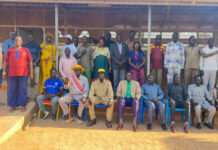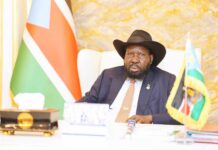President Salva Kiir Mayardit has urged lawmakers to put national interest above all and work in unity to address the pressing needs of the South Sudanese people.
Speaking at the official reopening of the first session of the reconstituted parliament on Wednesday, President Kiir emphasized that the public’s greatest desire is peace, development, and effective governance.
“Our people are tired of war; they long for lasting peace that builds roads, creates jobs, opens schools, and restores dignity,” Kiir told members of the house.
He called on legislators to be agents of real change and service delivery, operating with “unity, collaboration, urgency, and honor.”
“Let this parliament be the one that moved South Sudan from promises to progress,” he added.
President Kiir acknowledged the country’s economic struggles, citing the recent temporary shutdown of oil production, which led to salary payment delays for civil servants and organized forces. However, he reassured the nation:
“Thanks to decisive action, oil production has resumed, and we are moving steadily towards stability.”
He directed the Vice President in charge of the Economic Cluster to prioritize timely salary payments and restoration of essential services.
In closing, President Kiir made a strong appeal to lawmakers:
“Serve with integrity and respond to the hopes of every South Sudanese child, mother, soldier, and farmer.”
Meanwhile, Speaker of the Transitional National Legislative Assembly (TNLA), Rt. Hon. Jemma Nunu Kumba, called for urgent medical funding for MPs. She said budget constraints had left some lawmakers without access to treatment.
“Healthy MPs mean a healthy, effective Parliament,” she stressed, urging the Ministry of Finance to prioritize medical care.
Hon. Kumba revealed that Parliament only received 40% of its allocated budget in the 2024–2025 fiscal year, forcing the cancellation of several planned activities.
“This situation is not unique to the legislature—it reflects broader fiscal constraints across public institutions, especially at the grassroots level,” she concluded.





